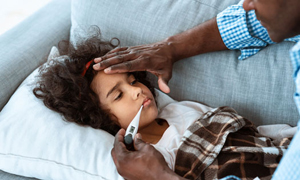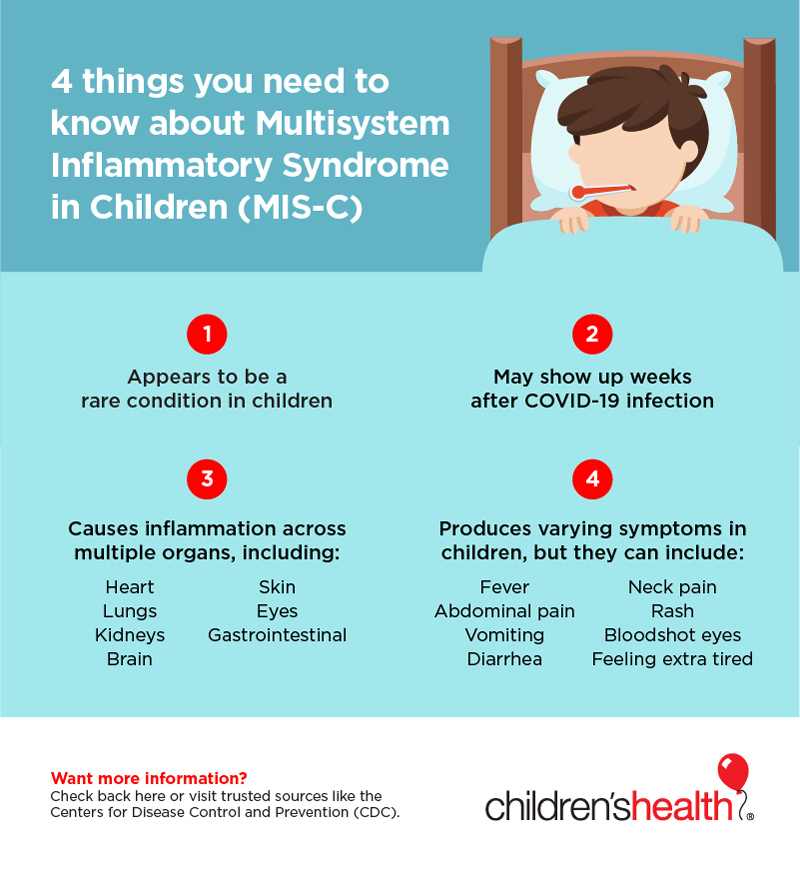What is multisystem inflammatory syndrome in children who've had COVID-19?
Multisystem inflammatory syndrome in children (MIS-C) is a rare condition that is associated with COVID-19 and usually occurs 2 to 6 weeks after a child is infected with COVID-19.MIS-C causes inflammation across multiple areas of the body including the:
- Heart
- Lungs
- Kidneys
- Brain
- Skin
- Eyes
- Gastrointestinal organs
The CDC is working with partners to track cases of MIS-C and to learn more about its risk factors. More information is needed to confirm the relationship between this inflammatory condition and COVID-19 and why it affects certain children and not others.
"The condition seems to be quite uncommon," explains Jeffrey Kahn, M.D., Director of Infectious Disease at Children's Health℠ and Professor at UT Southwestern. "The CDC has created a case definition to help with our understanding of this disease in children, including why some children get MIS-C and others do not."
What are symptoms of multisystem inflammatory syndrome in children?
 Children may develop symptoms up to 6 weeks after being infected with COVID-19 – or after being in close contact with someone who has COVID-19. The symptoms of MIS-C may vary in children, but may include:
Children may develop symptoms up to 6 weeks after being infected with COVID-19 – or after being in close contact with someone who has COVID-19. The symptoms of MIS-C may vary in children, but may include:
- Fever
- Stomach pain
- Vomiting
- Diarrhea
- Neck pain
- Rash
- Bloodshot eyes
- Feeling extra tired
If your child starts to show symptoms of MIS-C, contact your pediatrician. But it's important to know that having some of these symptoms does not mean a child has MIS-C. The CDC defines MIS-C as an illness that includes fever and evidence of multi-organ inflammation. In most cases, doctors will need to do tests to diagnose the condition.
It's time to get emergency care if your child has any of these symptoms:
- Trouble breathing
- Persistent pain or pressure in the chest
- New confusion
- Trouble staying awake
- Bluish lips or face
- Severe belly pain
While experts don't yet understand why some children develop MIS-C, they do know that children who do develop symptoms of MIS-C may not have shown typical symptoms of COVID-19 infection, such as respiratory symptoms.
"Children who develop MIS-C don't necessarily have typical COVID-19 symptoms. Instead, they may have a persistent fever and exaggerated features of inflammation," explains Dr. Kahn.
How can I protect my child against COVID-19 and MIS-C?
Cases of MIS-C are rare in children. Most children with COVID-19 infection develop only mild symptoms and recover without complications. The best thing you can do to prevent MIS-C is to encourage your child to take steps to prevent the spread of COVID-19, including:
- Staying up-to-date with vaccines for COVID-19
- Practicing proper hand washing (see tips for hand washing here)
- Not touching their face with unwashed hands
- Avoiding close contact with people who are sick
- Wearing a face mask if your community has a high level of COVID-19 or if your child has symptoms or tests positive for COVID-19
- Disinfecting frequently touched objects and surfaces daily
Learn more
Children's Health is committed to remaining a trusted source of health information and care for you and your family. See more resources to keep your family healthy at the Children's Health COVID-19 hub.

Thank you!
You are now subscribed to the Children's Health Family Newsletter.
Children's Health will not sell, share or rent your information to third parties. Please read our privacy policy.
